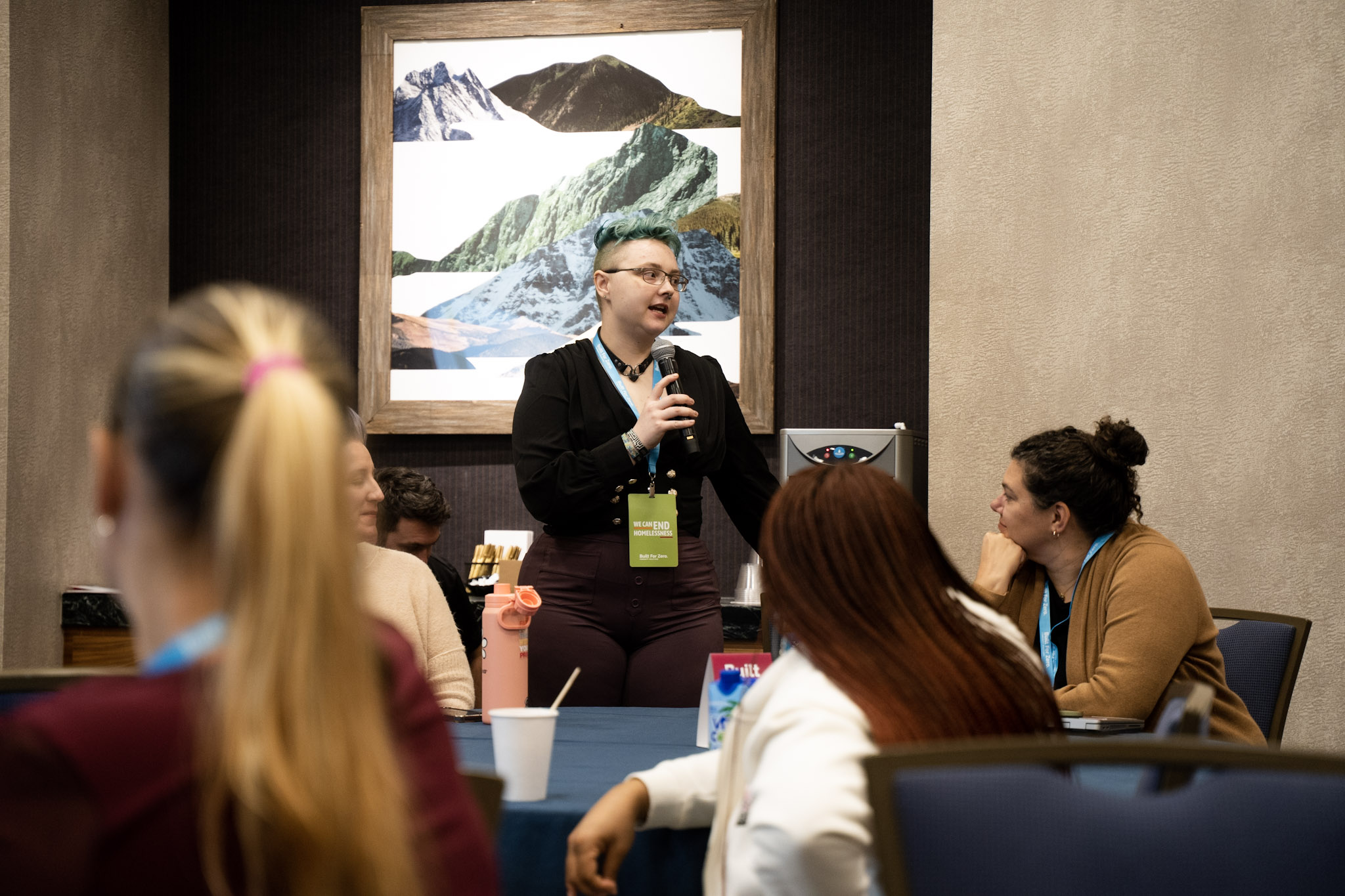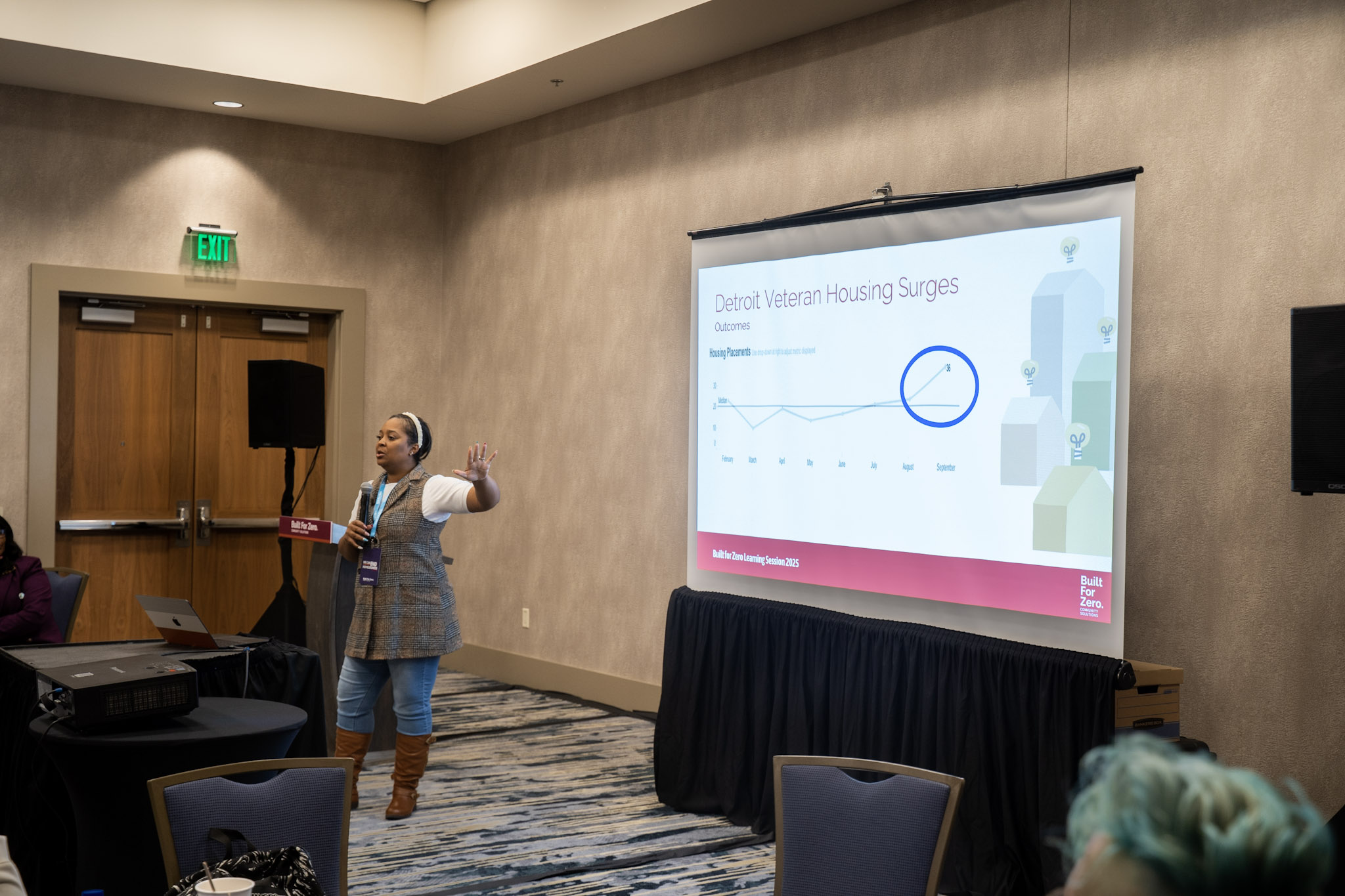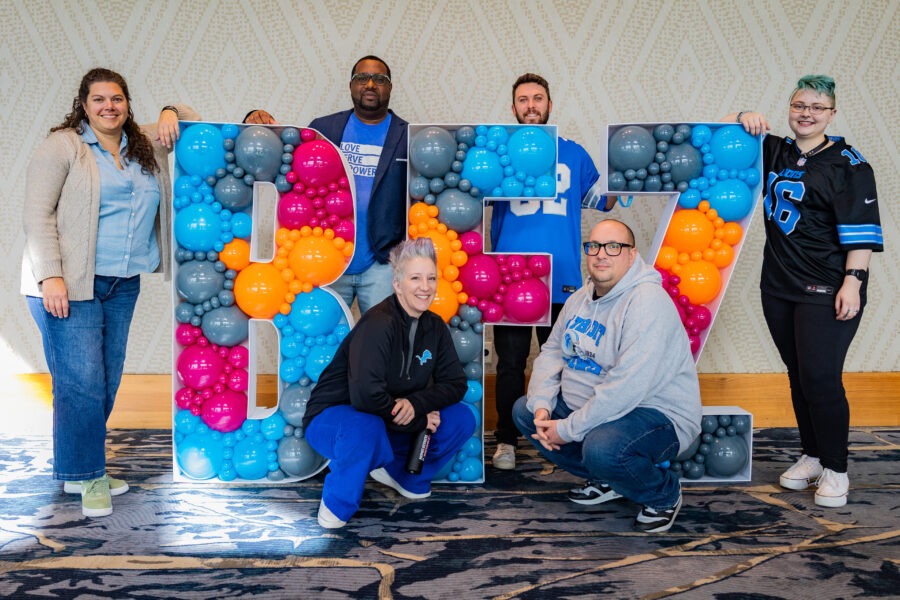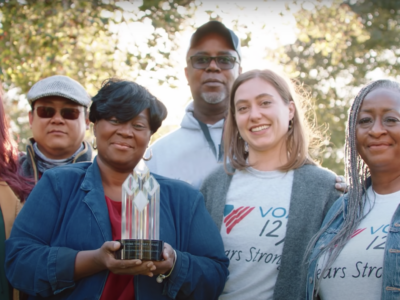On a humid August morning in Detroit, the room was packed. Frontline staff, city officials, funders, and veterans themselves gathered shoulder-to-shoulder at the first of several campaign rallies. There was music, cheers, and even a team-building exercise with a tennis ball that left people laughing and energized. But underneath the excitement was something deeper: a shared commitment to a promise.
No veteran should wait more than 75 days for a home.
That is the driving force behind Home in 75: #75DaysZeroExcuses, Detroit’s community-wide housing surge. It’s a bold countdown designed not just to place veterans in housing quickly, but to rewire the entire system so that homelessness for veterans in Detroit becomes rare, brief, and nonrecurring. The goal is clear: reach that milestone in 2026.
And this time, the city believes it can get there.
A city on the verge
Detroit is closer than most people realize. Veteran homelessness here has fallen sharply in recent years — a faster decline than almost anywhere else in the nation.
For Jennifer Tuzinsky, who leads Detroit’s coordinated effort to house veterans, the surge represents both urgency and possibility. “Home in 75 is our movement to ensure that any veteran who says, ‘I want to be housed,’ will be housed in 75 days or less,” she explained. “It’s about empowering everyone within our system and our veterans to really work together as a community to make it happen.”

“Home in 75 is our movement to ensure that any veteran who says, ‘I want to be housed,’ will be housed in 75 days or less.”
— Jennifer Tuzinsky
Why 75 days?
Traditionally, Detroit’s system aimed to house veterans within 90 days. But leaders noticed something troubling: cases slipping past day 89 often cascaded into delays, leaving veterans waiting far longer.
So they set a tougher target.
“Let’s aim for 75 days,” Tuzinsky said. “If something pushes it to 90, fine. But setting that higher bar motivates everyone to move with urgency.”
That urgency matters. In Detroit, the median length of time to house a veteran has been 100 days for non-Black veterans and 147 days for Black veterans. Closing disparities is a priority of the surge, with the team utilizing new data practices to flag risks early, expanding landlord partnerships in diverse neighborhoods, and applying flexible funds to remove financial barriers.
“The 75 Days, Zero Excuses campaign actually came out of a lot of data,” shared Rhi McGarry, Detroit’s data lead. “We really realized that we were so far off our 90-day expectation that we decided to make it even harder on ourselves, because that’s what Detroit does — we make things harder and then we rise to the challenge.”
Building a system that works
The surge isn’t just about speed. It’s about re-engineering how Detroit’s system functions.
Instead of siloed programs, Detroit now aims to operate as “one team,” with the VA, the Homeless Action Network of Detroit, shelters, and nonprofits all aligned around a shared by-name list — a living record that tracks every veteran experiencing homelessness and their path to housing.
Regular and intentional case conferencing helps partners identify barriers in real time. Flexible funding can clear obstacles — from paying off old rental debt to covering move-in costs — so that no veteran is left behind.
As McGarry explained, the by-name list captures vital documents, barriers, and housing preferences, ensuring that when a unit opens, the team knows exactly who is ready.
That kind of real-time, person-specific data has helped Detroit continue reducing homelessness, even as new veterans turn up in need of housing. A recent analysis by McGarry revealed something unexpected: most veterans entering homelessness are new, not returning. In response, the team shifted gears to emphasize prevention — keeping people housed — and diversion — helping veterans find safe options before they ever enter the shelter system.

Partnership in action: Rocket Mortgage
Among the most visible champions of this work is Rocket Mortgage. But their role goes far beyond writing checks.
The Rocket Community Fund first invested in Detroit’s Built for Zero work in 2018 and has been a steady partner ever since. Now, in the final push to further reduce veteran homelessness, the company has stepped fully into a leadership role.
“We have a mission at Rocket to help everyone home,” said Beth Sorce, Senior Director of Housing Stability at the Rocket Community Fund. That mission, she explained, has become a driving purpose across the company, whether it’s supporting a veteran seeking permanent stability or a first-time buyer entering the housing market.
As Detroit’s system entered what Sorce called the “last mile,” Rocket felt an increased urgency to step in more actively.
Sorce sits on the Veteran Leadership & System Improvement Council (VLSIC) alongside VA leaders, system leads, and frontline providers. There, Rocket helps guide strategy, communications, and engagement across sectors.
Beth Sorce said Rocket’s role is to ‘get into the weeds’ — listening to challenges frontline providers raise, and then either solving them directly or bringing in new partners who can help.
“Having Rocket at the table as both a funder and a leader cuts through red tape and builds credibility.”
— April McKie, Built for Zero System Improvement Advisor
That convening power has already paid off. Rocket helped bring the Michigan State Housing Development Authority and the Michigan Vital Document Department into the conversation — two players essential for voucher access and affordable housing. They’ve also opened doors for developers willing to set aside low-barrier units and for philanthropic funders interested in sustaining key system positions.
April McKie, a Built for Zero System Improvement Advisor and coach for Detroit, described Rocket’s dual role as transformative. “Having Rocket at the table as both a funder and a leader cuts through red tape and builds credibility,” she said. “Their involvement signals to the whole community that this is serious, and that the money will be spent well.”
Progress in real time
The surge is already producing results. The first surge, launched at the Volunteers of America (VOA) program site on September 1, aimed to house 20 veterans in just six weeks. By early October, the team had already housed 14 veterans, submitted seven additional applications, and was supporting two more through complex care needs. They are firmly on track to meet their goal.

Each surge is a live learning lab. The first took place at Volunteers of America’s transitional housing site, where partners tested new coordination methods. Those lessons then informed the next surge at the Michigan Veterans Foundation and efforts to better reach unsheltered veterans. Each round of learning makes the system stronger.
Dr. Gerald Curley of the Detroit VA noted that Detroit’s next steps require even deeper collaboration. “We’re going to have to get outside of our circle, the circle of our agency, the circle of our influence, and understand one another, so we’re all walking in lockstep,” he said.
Even with these early wins, leaders know the largest barriers remain.
Challenges still ahead
The surge is ambitious, but Detroit leaders are clear-eyed about what’s still needed.
“We continue to drive the use of traditional services like transitional housing downward, focusing more intentionally on supporting Veterans to permanent housing outcomes more quickly,” noted Curley.
Affordable, low-barrier and desirable housing remains the biggest bottleneck. Detroit estimates it needs 220 more units affordable to veterans, particularly at 30% AMI, in neighborhoods where veterans want to live.
Tuzinsky emphasized the importance of landlords in Detroit’s final push. Many veterans, she noted, are held back by old criminal records or poor credit histories. “They’ve served their time. They deserve a second chance,” she said. Having stable housing, she added, is what will keep them successful long term. What the system needs most now, Tuzinsky explained, are more landlords willing to open their doors to veterans and provide truly affordable, low-barrier units.
Why it matters
Detroit’s surge is not just about one city. It’s about proving that large urban communities can build systems where homelessness is rare and brief.
“Detroit has always been known for grit,” McKie said. “This work shows what happens when a city leans into that spirit and applies it to housing.”
The lessons learned here about data, prevention, equity, and cross-sector collaboration are already rippling to other large cities in Built for Zero’s network. Rocket Community Fund is supporting peer-to-peer exchanges so that communities can adapt Detroit’s playbook.
Beth Sorce described the final push as the hardest part: “the last mile, the last foot, the last inch — each of those is going to be the hardest.” She urged leaders to do what they can, whether that’s calling landlords, making introductions at City Hall, or even just offering space to host meetings. No one can do everything, she emphasized, but everyone can do something.

“Detroit is ready to stand behind our veterans as one team.”
— Beth Sorce, Rocket Community Fund
A shared north star
At the rallies, when the tennis ball exercise ended, the message was clear: systems can change. A process that started clunky and slow was reimagined by the group until it flowed seamlessly, the ball racing through in a fraction of the time.
That, McGarry said, is the metaphor for Detroit’s surge. Each team approached the same challenge differently, she explained, underscoring how Detroit is reshaping its system to better serve veterans.
What gave Sorce confidence wasn’t just the data or dollars, but the passion in the room. She described hearing an “overwhelming passion for serving veterans” — a sincere commitment to do more. “Detroit is ready to stand behind our veterans as one team,” she recalled.
As Detroit races toward January 2026, that collective spirit may be its greatest asset. A city built on grit, powered by collaboration, and guided by a clear North Star: ensuring every veteran has a home.




